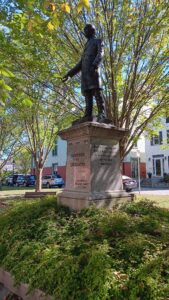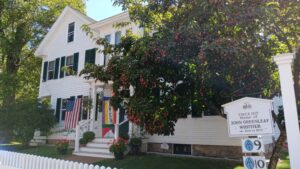My abolitionism tour is off to a fast start. On Friday I went to Newburyport to see some places related to William Lloyd Garrison. On Saturday I visited the Amesbury home, grave, and birthplace of John Greenleaf Whittier.
 Garrison, the most prominent abolitionist of his time, was born in Newburyport in 1805. In 1831 he launched The Liberator in Boston, which continued until the end of the Civil War. In Newburyport I stopped by his birthplace, where the original house still stands (but isn’t open to the public) and saw his statue in front of City Hall.
Garrison, the most prominent abolitionist of his time, was born in Newburyport in 1805. In 1831 he launched The Liberator in Boston, which continued until the end of the Civil War. In Newburyport I stopped by his birthplace, where the original house still stands (but isn’t open to the public) and saw his statue in front of City Hall.
Whittier was a famous poet as well as an advocate of abolishing slavery. He was born in Haverhill, lived for years in Amesbury, and died in Hampton Falls, NH. Garrison published his first poem and advanced Whittier’s career. On Saturday as I was researching this tour, I saw that the house was open and offering tours only that day, so I headed down. The people there were very nice, and the tour was detailed. I bought a book of his poetry and a mug for tea.
His grave is in Amesbury, just a few miles from the house, so I headed that way. After some wandering, I found a small sign indicating the “Whittier Path” to his grave. Thousands came to his funeral, but his grave has a simple stone that reads just “Here Whittier Lies.” His birthplace in Haverhill was almost directly on my way home, so I made that my final stop. The house wasn’t open, but I walked around it. It’s oddly painted, red on one side and white on the other.
Garrison showed extraordinary courage and consistency in his fight against slavery. He sometimes faced violence, and he probably would have been killed if he had gone to the South. Here’s one of his many statements against slavery, from an address delivered on February 14, 1854:
Every slave is a stolen man; every slaveholder is a man-stealer. By no precedent, no example, no law, no compact, no purchase, no bequest, no inheritance, no combination of circumstances, is slaveholding right or justifiable. While a slave remains in his fetters, the land must have no rest. Whatever sanctions his doom must be pronounced accursed.
Whittier’s poems about slavery aren’t among his best-known works, but “The Christian Slave” and other poetry by him on the topic are worth reading.
 These trips didn’t require going more than 20 miles from my house, but I’ll need to make a trip to Boston soon for the next phase.
These trips didn’t require going more than 20 miles from my house, but I’ll need to make a trip to Boston soon for the next phase.